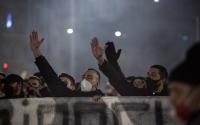Common Dreams / Published on Monday, April 18, 2005 by the Los Angeles TimesDoug Smith
She hugged and laughed her way through war zones with an effervescence belying her seriousness of purpose.
No pass to get through a checkpoint? She leaned across her Iraqi driver to show the stern American guard the shock of blond hair beneath her flowing black robes.
"Please, please, please, please, please," she said, and then, "Where are you from?"
She waved aside tough-looking guards from all corners of the world, never looking back to see if they had raised an AK-47 in her direction. In her one-woman mission to make the United States take responsibility for the innocent victims of its wars, 28-year-old Marla Ruzicka bubbled with a passion that seemed to lift her beyond danger.
Iraq's random violence caught up with Ruzicka on Saturday. Her car pulled alongside a convoy of U.S. contractors just as a suicide bomber detonated his car. Ruzicka, her driver-translator and one guard on the convoy were killed. Five other people were wounded.
Her death stunned a wide circle of diplomats, government officials, soldiers, journalists and ordinary people from Baghdad to Kabul, Afghanistan.
"God bless her pure soul, she was trying to help us," said Haj Natheer Bashir, the brother-in-law of an Iraqi teenager Ruzicka was trying to evacuate to the San Francisco Bay area for surgery. "She was just a kind lady."
A former Marine who now works for the State Department in Baghdad, said: "She was a remarkable woman and a kind person, and she affected everyone she came in contact with." The diplomat said he was not authorized to speak on the record about Ruzicka because her remains were awaiting DNA analysis for positive identification.
It wasn't clear where Ruzicka was going, why she was on the notoriously dangerous Baghdad airport road, or why her car pulled up alongside a convoy. Almost all Baghdad drivers slam on their brakes as soon as they see a row of slow-moving SUVs ahead to avoid getting in the way of possible car-bomb attacks.
Raised in conservative Lakeport, Calif., north of San Francisco, the 5-foot-3 Ruzicka was a high school basketball star and a leading three-point shooter. She also showed an early attraction toward humanitarian causes.
Ruzicka and her twin brother, Mark, were the youngest of six children of Clifford and Nancy Ruzicka. Mark, who gathered with family and friends at her parents' home in Lakeport on Sunday, said his twin sister had led a school protest against the Persian Gulf War in 1991 when she was in eighth grade, and was promptly suspended.
Her high school principal, Pat McGuire, sent an e-mail to the Ruzicka family on Sunday after learning of her death, recalling that reading the novel "Cry, the Beloved Country" and watching a videotape of the slaying of a young American woman in South Africa had ignited the desire in her to do humanitarian work.
During her college years at Long Island University she traveled to countries including Cuba, Guatemala and Costa Rica. When she visited Israel, she also traveled to Ramallah on the West Bank.
Her father, 69, a civil engineer, said the family became accustomed to her travels.
"She had a lot of purpose in her life, so it was kind of natural that she would go into places like these," he said. He added that he was proud of her as a "lady with a tremendously open heart and warm feelings toward the people who've been in conflict and war."
About 10 years ago, she showed up at the San Francisco offices of the left-leaning Global Exchange, said its founder, Medea Benjamin, who was the Green Party's candidate for the U.S. Senate in 2000.
She accompanied Benjamin to Afghanistan in 2001 after the war to oust the Taliban, and came back a changed person, said her friend and volunteer attorney, David Frankel.
"She could no longer relate to the boring, mundane details of ordinary life," Frankel said.
Ruzicka returned to Afghanistan on her own funds, "finding people who were hurt, finding what they needed -- an artificial limb, a skin graft, a new roof over their house. She would find a way to fill the need directly," he said.
A few days after Baghdad fell in April 2003, Ruzicka showed up in Iraq. She began building a volunteer network to document civilian casualties.
The records they compiled on more than 2,000 dead provided an early accounting of the war's toll. Although the currently accepted figure, based largely on news accounts, is between 17,000 and 20,000, Ruzicka's stands out because of the detail it contains, said Newsweek reporter Owen Matthews, a friend of Ruzicka.
Several friends said Ruzicka experienced steep emotional swings and had a troubled side to her life that drove her.
"This was her therapy," said Matthews.
As she struggled to build her own organization, Campaign for Innocent Victims in Conflict, Ruzicka began shuttling between Baghdad, an office in New York and her parents' home in the Bay area.
She also traveled to Washington to lobby for assistance for Iraqi war victims. Tim Rieser, an aide to Sen. Patrick J. Leahy, D-Vt., credited Ruzicka with inspiring an appropriation of $17.5 million in aid to Afghanistan and Iraq.
Her own fund-raising effort wasn't taking off, though.
"We always thought we would raise more than we could," said Kathleen Aguilera, a friend and former staff member.
Ruzicka had been away from Iraq since summer, and returned to Baghdad several weeks ago. Aguilera said she thought Ruzicka was "hoping to bring it to the heart with individual donors" by collecting of individual tragedies.
Benjamin said she had cautioned Ruzicka about the danger of going back.
"I thought it would be better to wait for a while and see if the situation got better than to put her life at risk," Benjamin said. "She was determined to go because the people she worked with didn't have the luxury not to be at risk."
Baghdad had changed since the early months after the war, when Western civilians could mingle with Iraqis in many parts of the country. In the new Baghdad, every excursion by Westerners outside a guarded compound is a carefully planned mission with two cars and a bodyguard.
Aid workers have not been immune from the violence. Irish-born Margaret Hassan of Care International was killed by kidnappers in November.
Reporters seek to blend in by growing beards and wearing the casual look popular among Iraqis. Ruzicka adopted the flowing abaya and head coverings that Western women now use in transit. Still, ebullient and given to an irrepressible laugh, Ruzicka hardly blended in. Humanitarian organizations shun publicity, but Ruzicka openly courted the media.
"I need it for my fund raising," she said.
Running her operation on a shoestring, Ruzicka was accompanied only by Faiz Ali Salim, 43, who served as her driver and translator. An unemployed commercial pilot, Ali Salim had become Ruzicka's right-hand man in Iraq after the war. Now the father of a baby girl and once again flying for Iraqi Air, he was doing his last tour with Ruzicka.
Despite the risks, Ruzicka traveled all over Baghdad. In one day, she met a government minister, visited a hospital, the U.S. military's Iraqi assistance center and conferred for hours with a reporter, searching for civilians wounded by U.S. military action.
It was Matthews, the Newsweek reporter, who gave Ruzicka one of her leads. In March, he had written about Rakan Hassan, a youth from Mosul orphaned and partially paralyzed by fire from a helicopter gunship.
Ruzicka had visited Hassan in the northern city and thought she could find a sponsor to get him to Oakland for surgery. The family had taken out passports and Ruzicka was working on getting visas. A doctor was going to be hired to make X-rays. Matthews said he was going to lend her $300.
On Saturday, Ruzicka had planned a party. But she wasn't there. News of her death came in fragments that no one could confirm.
By morning, cellphones had carried it to Kabul, Vienna, Austria; Amman, Jordan; Washington and San Francisco. Late in the day, Bashir, the wounded young Iraqi's brother-in-law, answered a phone in Mosul and learned that the boy's benefactor would not return.
On the day before she died, Ruzicka called her parents. She got their answering machine, and left a short message telling them she loved them.
Her father recalled admonishing her in their last conversation to be careful.
"Daddy," she said, "I will be careful."
Staff writers Jia-Rui Chong in Los Angeles, Saif Rasheed and Raheem Salman in Baghdad, and Times correspondent Robert Hollis in Lakeport contributed to this article.






